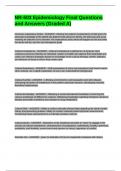NR-503 Epidemiology Final Questions
and Answers (Graded A)
Kleinman explanatory Model - ANSWER - Eliciting the patient's (explanatory) model gives the
physician knowledge of the beliefs the patient holds about his illness, the personal and social
meaning he attaches to his disorder, his expectations about what will happen to him and what
the doctor will do, and his own therapeutic goals
Cultural competence - ANSWER - Cultural competence is defined as "a dynamic, fluid,
continuous process whereby an individual, system or health care agency find meaningful and
useful care delivery strategies based on knowledge of the cultural heritage, beliefs, attitudes,
and behavior of those to whom they render care"
Cultural Awareness - ANSWER - :Self-examination of one's own prejudices and biases toward
other cultures. An in-depth exploration of one's own cultural/ethnic background.
Cultural humility - ANSWER - A lifelong commitment to self-evaluation and self-critiques,
redressing the power of imbalances in the patient- physician dynamic, developing mutually.
Beneficial relationships.
Cultural Knowledge - ANSWER - Obtaining a sound educational foundation concerning the
various worldviews of differences cultures. Obtaining knowledge regarding biological variations,
disease and health conditions and variation in drug metabolism.
Cultural Skill: - ANSWER - Ability to collect culturally relevant data regarding the client's health
history and presenting problem. Ability to conduct culturally based physician assessments.
Conducting these assessments in a culturally sensitive manner.
Cultural Desire - ANSWER - Motivation of the healthcare provider to "want" to engage in the
process of cultural competence, characteristics of compassion, authenticity, humility, openness,
availability, and flexibility, commi tment and passion to caring, regardless of conflict.
Absolute risk - ANSWER - gives no indication of how its magnitude compares with others.
,The odds ratio - ANSWER - closely approximates the relative risk if the disease is rare.
Odds ratio and the relative risk are used - ANSWER - to assess the strength of association
between risk factor and outcome.
ethnicity - ANSWER - as "the aggregate of cultural practices, social influences, religious
pursuits, and racial characteristics shaping the distinctive identity of community"
Cultural competence in nursing consists of four principles. - ANSWER - Care is designed for the
specific client.
Care is based on the uniqueness of the person's culture and includes cultural norms and
values.
Care includes self-employment strategies to facilitate client decision making to improve health
behaviors.
Care is provided with sensitivity and is based on the cultural uniqueness of clients.
The APN may also use the Kleinman Explanatory Model of Illness (1978). Below are the
questions that can be utilized. - ANSWER - What do you call your problem?
What do you think caused your problem?
Why do you think it started when it did?
What does your sickness do to you?
What do you fear most about your sickness?
What are the chief problems your sickness has caused you?
What kind of treatment do you think you should receive?
What is the most important result you hope to receive from the treatment?
According to Giger and Davidhizer (2000), although cultures differ, they all have the same basic
organizing factors that must be assessed in order to provide care for culturally diverse patients.
These factors include - ANSWER - communication (verbal and nonverbal);
personal space;
social organization;
time perception;
environmental control; and
, biological variations.
The National Center for Cultural Competence (NCCC) provides national leadership and
contributes to the body of knowledge on cultural and linguistic competency within systems and
organizations. Major emphasis is placed on translating evidence into policy and practice for
programs and personnel concerned with health and mental healthcare delivery, administration,
education, and advocacy. - ANSWER -
The NCCC uses four major approaches to fulfill its mission, including - ANSWER - Web-based
technical assistance, (2) knowledge development and dissemination, (3) supporting a
community of learners, and (4) collaboration and partnerships with diverse groups.
These approaches entail the provision of training, technical assistance, and consultation and
are intended to facilitate networking, linkages, and information exchange. The NCCC has
particular expertise in developing instruments and conducting organizational self-assessment
processes to advance cultural and linguistic competency. - ANSWER -
Epidemiological Triad: - ANSWER - host, agent, environment
Genetics is considered an agent in the epidemiological triad - ANSWER -
Genetics - ANSWER - The study of individual genes and their impact on relatively rare single
gene disorders
Genomics - ANSWER - The study of all genes in the human genome as well as their interaction
with other genes, the individual's environment, and the influence of cultural and psychosocial
factors
Genetic epidemiology - ANSWER - the link of epidemiology and genetics
Absolute risk - ANSWER - is the probability of an event, such as illness, injury, or death
Attrubutible risk - ANSWER - is used to make risk-based decisions for individuals.




